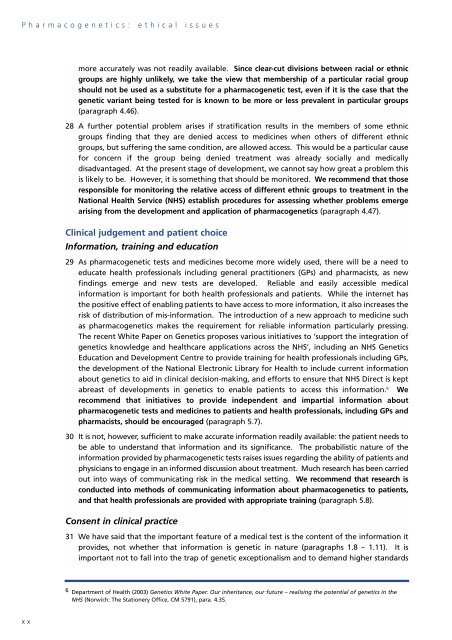Summary and recommendations - Nuffield Council on Bioethics
Summary and recommendations - Nuffield Council on Bioethics
Summary and recommendations - Nuffield Council on Bioethics
Create successful ePaper yourself
Turn your PDF publications into a flip-book with our unique Google optimized e-Paper software.
Pharmacogenetics: ethical issues<br />
more accurately was not readily available. Since clear-cut divisi<strong>on</strong>s between racial or ethnic<br />
groups are highly unlikely, we take the view that membership of a particular racial group<br />
should not be used as a substitute for a pharmacogenetic test, even if it is the case that the<br />
genetic variant being tested for is known to be more or less prevalent in particular groups<br />
(paragraph 4.46).<br />
28 A further potential problem arises if stratificati<strong>on</strong> results in the members of some ethnic<br />
groups finding that they are denied access to medicines when others of different ethnic<br />
groups, but suffering the same c<strong>on</strong>diti<strong>on</strong>, are allowed access. This would be a particular cause<br />
for c<strong>on</strong>cern if the group being denied treatment was already socially <str<strong>on</strong>g>and</str<strong>on</strong>g> medically<br />
disadvantaged. At the present stage of development, we cannot say how great a problem this<br />
is likely to be. However, it is something that should be m<strong>on</strong>itored. We recommend that those<br />
resp<strong>on</strong>sible for m<strong>on</strong>itoring the relative access of different ethnic groups to treatment in the<br />
Nati<strong>on</strong>al Health Service (NHS) establish procedures for assessing whether problems emerge<br />
arising from the development <str<strong>on</strong>g>and</str<strong>on</strong>g> applicati<strong>on</strong> of pharmacogenetics (paragraph 4.47).<br />
Clinical judgement <str<strong>on</strong>g>and</str<strong>on</strong>g> patient choice<br />
Informati<strong>on</strong>, training <str<strong>on</strong>g>and</str<strong>on</strong>g> educati<strong>on</strong><br />
29 As pharmacogenetic tests <str<strong>on</strong>g>and</str<strong>on</strong>g> medicines become more widely used, there will be a need to<br />
educate health professi<strong>on</strong>als including general practiti<strong>on</strong>ers (GPs) <str<strong>on</strong>g>and</str<strong>on</strong>g> pharmacists, as new<br />
findings emerge <str<strong>on</strong>g>and</str<strong>on</strong>g> new tests are developed. Reliable <str<strong>on</strong>g>and</str<strong>on</strong>g> easily accessible medical<br />
informati<strong>on</strong> is important for both health professi<strong>on</strong>als <str<strong>on</strong>g>and</str<strong>on</strong>g> patients. While the internet has<br />
the positive effect of enabling patients to have access to more informati<strong>on</strong>, it also increases the<br />
risk of distributi<strong>on</strong> of mis-informati<strong>on</strong>. The introducti<strong>on</strong> of a new approach to medicine such<br />
as pharmacogenetics makes the requirement for reliable informati<strong>on</strong> particularly pressing.<br />
The recent White Paper <strong>on</strong> Genetics proposes various initiatives to ‘support the integrati<strong>on</strong> of<br />
genetics knowledge <str<strong>on</strong>g>and</str<strong>on</strong>g> healthcare applicati<strong>on</strong>s across the NHS’, including an NHS Genetics<br />
Educati<strong>on</strong> <str<strong>on</strong>g>and</str<strong>on</strong>g> Development Centre to provide training for health professi<strong>on</strong>als including GPs,<br />
the development of the Nati<strong>on</strong>al Electr<strong>on</strong>ic Library for Health to include current informati<strong>on</strong><br />
about genetics to aid in clinical decisi<strong>on</strong>-making, <str<strong>on</strong>g>and</str<strong>on</strong>g> efforts to ensure that NHS Direct is kept<br />
abreast of developments in genetics to enable patients to access this informati<strong>on</strong>. 6 We<br />
recommend that initiatives to provide independent <str<strong>on</strong>g>and</str<strong>on</strong>g> impartial informati<strong>on</strong> about<br />
pharmacogenetic tests <str<strong>on</strong>g>and</str<strong>on</strong>g> medicines to patients <str<strong>on</strong>g>and</str<strong>on</strong>g> health professi<strong>on</strong>als, including GPs <str<strong>on</strong>g>and</str<strong>on</strong>g><br />
pharmacists, should be encouraged (paragraph 5.7).<br />
30 It is not, however, sufficient to make accurate informati<strong>on</strong> readily available: the patient needs to<br />
be able to underst<str<strong>on</strong>g>and</str<strong>on</strong>g> that informati<strong>on</strong> <str<strong>on</strong>g>and</str<strong>on</strong>g> its significance. The probabilistic nature of the<br />
informati<strong>on</strong> provided by pharmacogenetic tests raises issues regarding the ability of patients <str<strong>on</strong>g>and</str<strong>on</strong>g><br />
physicians to engage in an informed discussi<strong>on</strong> about treatment. Much research has been carried<br />
out into ways of communicating risk in the medical setting. We recommend that research is<br />
c<strong>on</strong>ducted into methods of communicating informati<strong>on</strong> about pharmacogenetics to patients,<br />
<str<strong>on</strong>g>and</str<strong>on</strong>g> that health professi<strong>on</strong>als are provided with appropriate training (paragraph 5.8).<br />
C<strong>on</strong>sent in clinical practice<br />
31 We have said that the important feature of a medical test is the c<strong>on</strong>tent of the informati<strong>on</strong> it<br />
provides, not whether that informati<strong>on</strong> is genetic in nature (paragraphs 1.8 – 1.11). It is<br />
important not to fall into the trap of genetic excepti<strong>on</strong>alism <str<strong>on</strong>g>and</str<strong>on</strong>g> to dem<str<strong>on</strong>g>and</str<strong>on</strong>g> higher st<str<strong>on</strong>g>and</str<strong>on</strong>g>ards<br />
6 Department of Health (2003) Genetics White Paper. Our inheritance, our future – realising the potential of genetics in the<br />
NHS (Norwich: The Stati<strong>on</strong>ery Office, CM 5791), para. 4.35.<br />
xx

















